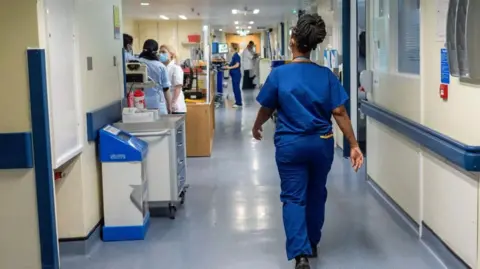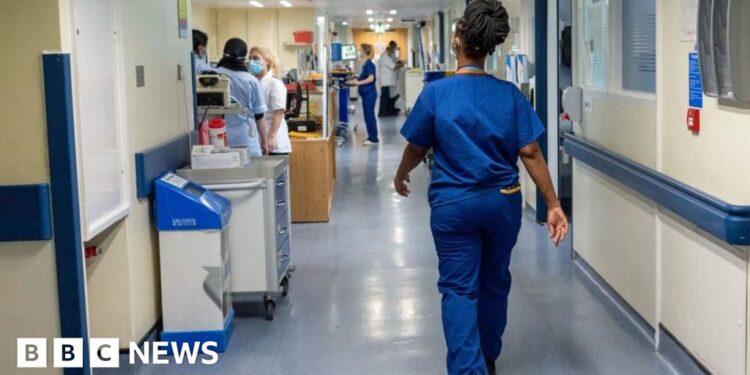[ad_1]
Health correspondent
Political correspondent
 PA Media
PA MediaThe government has announced NHS England will be abolished to “cut bureaucracy” and reform how the National Health Service is run.
The changes will not impact anyone’s access to the NHS – but Prime Minister Sir Keir Starmer said it would bring management of the health service in England “back into democratic control” and free up money for front-line services.
Around 9,000 administrative roles are being cut at NHS England and the Department of Health and Social Care as part of the changes – amounting to roughly half of all roles at the two organisations.
As part of Your Voice Your BBC, we asked for your questions on the plans and what they could mean for you – below we have answered them for you.
What does NHS England do?
NHS England is the organisation which leads the health service in England. It was given autonomy by the Conservatives in 2012 with the aim of freeing the health service from interference by politicians.
It takes the money provided by the government and funnels it into the different parts of the health service.
It has therefore been NHS England’s job to translate ministers’ priorities into the services people get on the front line.
The body is also responsible for things like overseeing training and collecting data, as well as managing GP services.
The announcement will not impact how the NHS is structured in other UK regions.
Did this decision come out of the blue?
Within the NHS and Westminster, the writing has been on the wall for NHS England for some months.
Even in the latter years of the Tory government, health ministers expressed frustration that they were not in charge of the day-to-day running of the health service.
When Labour came into power, it was clear Health Secretary Wes Streeting wanted more control of the NHS and saw a lot of duplication and bureaucracy.
NHS England’s chief executive Amanda Pritchard recently said she would step down at the end of the March and a number of her senior leadership team have followed suit.
In that respect, it was clear there was going to be significant reform – but this is as big a change as you could possibly get at the heart of the NHS management structure.
What is a ‘quango’ – and why do ministers think ‘bureaucracy’ is a problem?
These are two words we have heard the government use a lot when setting out these changes.
In this context, bureaucracy is a stand-in word for a system that is particularly complicated, or requires excessive amounts of administration, paperwork, regulations or layers of management.
Starmer made it clear he thinks this admin is getting in the way of delivering health services.
We also heard him describe NHS England as the “world’s largest quango” – a term that stands for Quasi-Autonomous Non-Governmental Organisation.
In short, they are bodies like regulators and advisory groups, which are funded by taxpayers but not directly controlled by central government. They do things on behalf of the government, but at an arm’s length.
They range from big organisations you will have heard of like NHS England, Network Rail and the Environment Agency to smaller ones like the British Film Institute and Gambling Commission.
Their numbers have fallen by more than half since 2010 because David Cameron’s coalition government abolished nearly 300 – but there are still more than 300 across the UK.
Labour has set up more than 20 since winning the election last July, including Great British Energy and Skills England.
The total budget for quangos in 2022/23 – when the latest figures were published – was £353bn.
Will local authorities have more control over decision-making and budgets?
It looks likely that some of the responsibilities NHS England currently holds will be devolved down to regional bodies.
Jeremy Hunt, the former health secretary, has talked about how he felt NHS England was stifling innovation.
One of the arguments being made about NHS reform is that if you move decision-making down to a local level and nearer to patients, it will be local health leaders who are more attuned to the needs of patients in the area making those calls.
They will know what local populations need and where the weaknesses are – and that, in theory, could improve services for patients in different parts of the country.
Will this mean an increase in funding to the NHS and better access to medicines?
Thursday’s announcement was not about funding – that is expected in the summer.
We already know NHS is getting an uplift of about 3-4% next year and we do not yet know what spending will look like beyond that.
But government sources believe scrapping NHS England will save the government £500m a year.
On access to medicines, it is the National Institute for Health and Care Excellence – which is separate from NHS England – which sets the guidelines on what treatments are judged affordable and cost effective.
When a new drug is produced by the pharmaceutical industry, the institute will decide if the NHS can afford it and whether it is better than other drugs that are used.
[ad_2]
Source link : https://www.bbc.com/news/articles/crknrrz7ln6o
Author :
Publish date : 2025-03-13 16:40:00
Copyright for syndicated content belongs to the linked Source.















